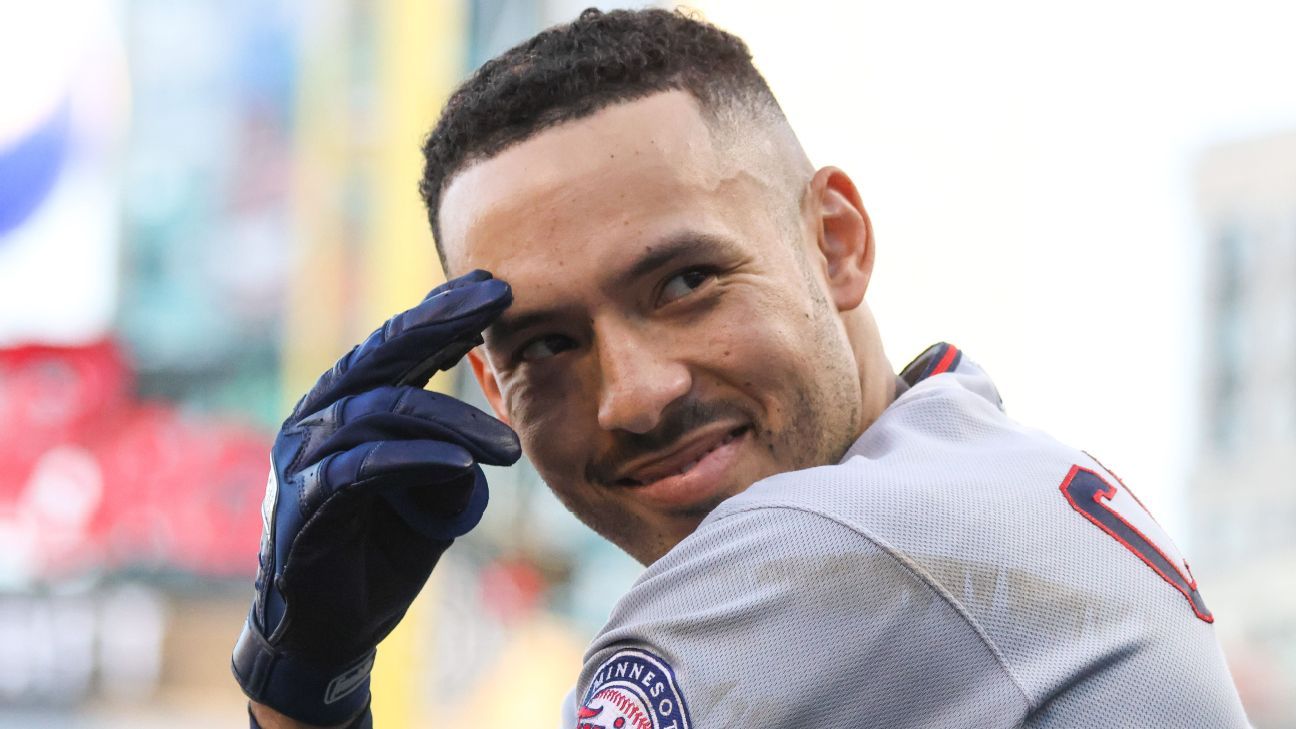‘It’s about being smarter’: How Carlos Correa is approaching his future after wild offseason

FORT MYERS, Fla. — Carlos Correa had been feeling great — really, he felt spectacular. At the end of a long season, he had been working out without issues, even playing tennis with his sister, as he waited to see how his free agency played out. And so he is the first to acknowledge: The collapse of the record-setting $350 million deal with the San Francisco Giants was a stunner. Correa had assumed that passing the Giants’ physical examination was a fait accompli. “I’m like, ‘Easy money,'” Correa recalled.
Then, after the Giants’ retreat, New York Mets owner Steve Cohen swooped in with a $315 million offer — but that, too, disintegrated, over doctors’ doubts about the leg injury nearly a decade old. “The second one was more shocking,” Correa said. To his understanding, the Mets had made the agreement knowing about the leg concern.
“When it fell through, it was like, ‘Oh, s—.'”
The series of events was unprecedented, a superstar and his value tumbling into negotiation vertigo, and Correa needed certainty. He told his agent, “Hey, take me where I’m wanted.”
And so it came to pass that Correa ambled back into the Minnesota Twins‘ camp earlier this spring, a place few thought he’d have ever entered in the first place. From the early days of Correa’s career, the industry assumption was the former No. 1 overall pick — an ambitious prodigy who asked his parents at age 8 for English lessons so that he’d be equipped to conduct second-language interviews as an adult — would find his way onto the biggest and brightest stage possible, almost certainly New York or L.A. or Wrigley Field.
But now he is likely to spend the rest of his career in Minneapolis, and the Twins’ staffers, who had gotten to know Correa in what they assumed would be a one-and-done season of 2022, felt the depth of his commitment immediately. Correa’s present and future are settled, and he’s all-in, intent on winning as much as possible — and on playing as much as possible, now that he has absorbed the feedback from doctors about his leg. Correa has shaped his career with analytics — he loves, uses and relies on numbers — and understands risk management. Based on what he’s heard from those doctors and his own, he’s already started to adapt.
“We are not going to play tennis anymore,” he said of those offseason sessions with his sister. “I am not going to play basketball anymore. We aren’t going to do these things that are outside the box of my profession. It’s about being smarter than that.”
Correa is a giant among shortstops, 6-foot-4 and 220 pounds, and he readily acknowledges that he’ll eventually move to third base (a switch he would’ve made if he had signed with the Mets). If he could benefit from less time on his feet, a reduction in his workout regimen — the sort of mid-career career change that has helped Aaron Judge, among others — then he’s intent on figuring it out. He’ll learn how to do more with less. The failed physicals are part of his history now, but any anger, any frustration over the way his winter played out has been effectively compartmentalized. He is moving on.
“You know, there’s not many things that will bring me down,” Correa said, sitting at a picnic table next to a half-field at the Twins’ complex. “I don’t focus on what’s outside. I focus on what’s inside. By saying inside, I mean my family members, my friends, my teammates and the people that truly are in my safe place.
“I always say that the boat will never sink into the water that surrounds it. The water you let get into your life, that’s what’s going to sink your boat. All that outside noise and all the outside stuff that I cannot control, it’s never affected me. I just keep going on with life, and I keep trying to make a positive impact with the people around me.”
THE DAY BEFORE Correa had arrived in the Twins’ camp, he had been alerted by the team that some media members would be there to document the return of a player now anointed — through the sheer magnitude of his contract — as an heir to Kirby Puckett and Joe Mauer and Justin Morneau.
He told them he would come through the clubhouse doors at 8:45 a.m., and as it turned out, his ETA was off. At 8:44, Correa stepped into the room. His personality filled the room as he greeted old and new teammates with handshakes and hugs. Twins pitcher Sonny Gray had texted during the chaos of Correa’s winter, asking Correa how he was doing, and at that time, Gray said, the idea that Correa might return to Minnesota was never raised. It wasn’t a thought. “But he’s here now,” Gray said, smiling, talking about how Correa, center fielder Byron Buxton and new catcher Christian Vazquez will anchor a strong defense. Not long after Correa had set down his bag in the corner locker of the Twins’ clubhouse, he went out to the cages for swings, his voice resonating about the echoes of bat cracks. Then Correa jogged out to the half-field where three coaches waited for him, and he shouted happily and cajoled as he gloved and whipped baseballs through a series of drills. Then he stopped by a small group of fans to sign autographs.
“I’m glad you’re back, Carlos,” one of them said.
“Me, too,” he replied.